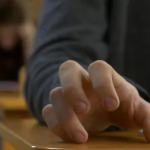Why do people fidget?
Fidgeting refers to repetitive behaviours that are unrelated to the task at hand – such as touching the face frequently, tapping fingers, smoothing clothing, rocking back and forth, pacing, etc.A sign of stress/anxiety?
Fidgeting can be a response to stress and anxiety. It is a prominent observable behaviour in social anxiety disorder and is also considered a symptom of hyperactivity which is associated with ADHD. Fidgeting helps to deal with restlessness, a symptom of anxiety disorders. As a survival mechanism, our bodies are designed to quickly kick into action when a threat is perceived using the fight/flight response. Upon encountering a threatening situation, the nervous system reacts by initiating a sequence of hormonal changes and physiological responses to fight or flee the situation. Adrenaline and cortisol hormones are released; the heart beats faster as blood is pushed to the muscles, lungs. With the elevated levels of stress hormones, the muscles are prepared for a sudden exertion.
However, this fight or flight response can be activated from mental stress as it prepares the body to react to the danger. The body can also overreact to stressors that are not life-threatening.
Since there is no actual danger, all of the adrenaline flooding the body cannot be used. This excess adrenaline leaves us with a lot of energy that causes physical discomfort, including feelings of restlessness. Restlessness is a direct result of the fight or flight response being activated. Fidgeting tells the brain that the body has excess energy which it needs to burn.
As a survival mechanism, our bodies are designed to quickly kick into action when a threat is perceived using the fight/flight response. Upon encountering a threatening situation, the nervous system reacts by initiating a sequence of hormonal changes and physiological responses to fight or flee the situation. Adrenaline and cortisol hormones are released; the heart beats faster as blood is pushed to the muscles, lungs. With the elevated levels of stress hormones, the muscles are prepared for a sudden exertion.
However, this fight or flight response can be activated from mental stress as it prepares the body to react to the danger. The body can also overreact to stressors that are not life-threatening.
Since there is no actual danger, all of the adrenaline flooding the body cannot be used. This excess adrenaline leaves us with a lot of energy that causes physical discomfort, including feelings of restlessness. Restlessness is a direct result of the fight or flight response being activated. Fidgeting tells the brain that the body has excess energy which it needs to burn.
A sign of other things?
- Fidgeting can be a response to boredom. When the brain is under-stimulated, it gives your brain something to focus on and is soothing as well. It helps get energy levels high enough to be able to concentrate again.
- If the task at hand is not able to sustain our attention, then the sensory-motor input due to fidgeting makes it more stimulating. This activates our brain such that we can sustain interest in the task – which helps us focus since our brain is fully engaged.
- Fidgeting may reflect self-regulation processes to help regulate our attention span. By using involuntary bodily movement when our mind wanders while performing a task.
- Fidgeting can be a coping mechanism.
- The cognitive load hypothesis suggests that when dealing with complex thoughts, we divert the cognitive load into movement, to focus on mental processes. There is also a genetic factor involved in fidgeting tendencies.
- Fidgeting also has been associated with many other mental disorders like eating disorders, alexithymia, and dysfunctional neurological states.

